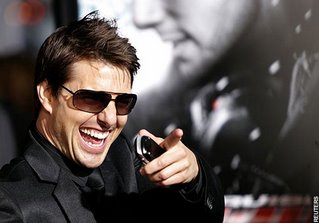Tuesday, November 07, 2006
All is forgiven if Tom Cruise saves United Artists

Acclaimed filmmaker and raconteur Michael Moore’s core reason for coming to Tom Cruise’s defense is generating laughs. Asked his opinion on the magazine photos of Cruise and Katie Holmes’ newborn baby, Moore lets loose an aw-shucks guffaw.
“I really think it’s time to quit picking on Tom Cruise,” Moore said, addressing an audience at the 2006 Toronto Film Festival. “His biggest crime is he jumped on Oprah’s couch.”
Cruise has been a favorite celebrity punching bag for many months. His recent films “The War of the Worlds” and “Mission: Impossible 3” failed to meet box-office expectations. His public relationship with actress Katie Holmes and his day-to-day promotion of Scientology have made him the butt of jokes. After a fourteen-year relationship, Paramount dropped Cruise in a surprisingly public manner over “personal conduct” believed to be hurting his movies financially.
More than the anticipated photos of his and Holmes’ baby, Cruise’s PR bounce back comes with the Nov. 3 announcement that he and producing partner Paula Wagner are in control of United Artists via a deal with the studio’s owners, MGM, and its parent company Sony. Wagner will become United Artists Chief Executive and Cruise will produce and star in many of the studio’s films. For United Artists, which started via a partnership by Charlie Chaplin, Douglas Fairbanks, Mary Pickford and DW Griffith and enjoyed success via its Pink Panther and James Bond franchises, as well as the Cruise/Dustin Hoffman drama “Rain Man,” Cruise’s involvement puts the low-profile film company back in the spotlight. For those of us with fond memories of United Artists and its history of moviemaking, Cruise’s decision to salvage the historic company compensates for much of his clownish public behavior. Of course, Cruise’s involvement offers no guarantees. Remember, in 1980, United Artists executives thought it had a commercial and critical hit with Michael Cimino’s epic Western “Heaven’s Gate.” Instead, the film bankrupted the company.